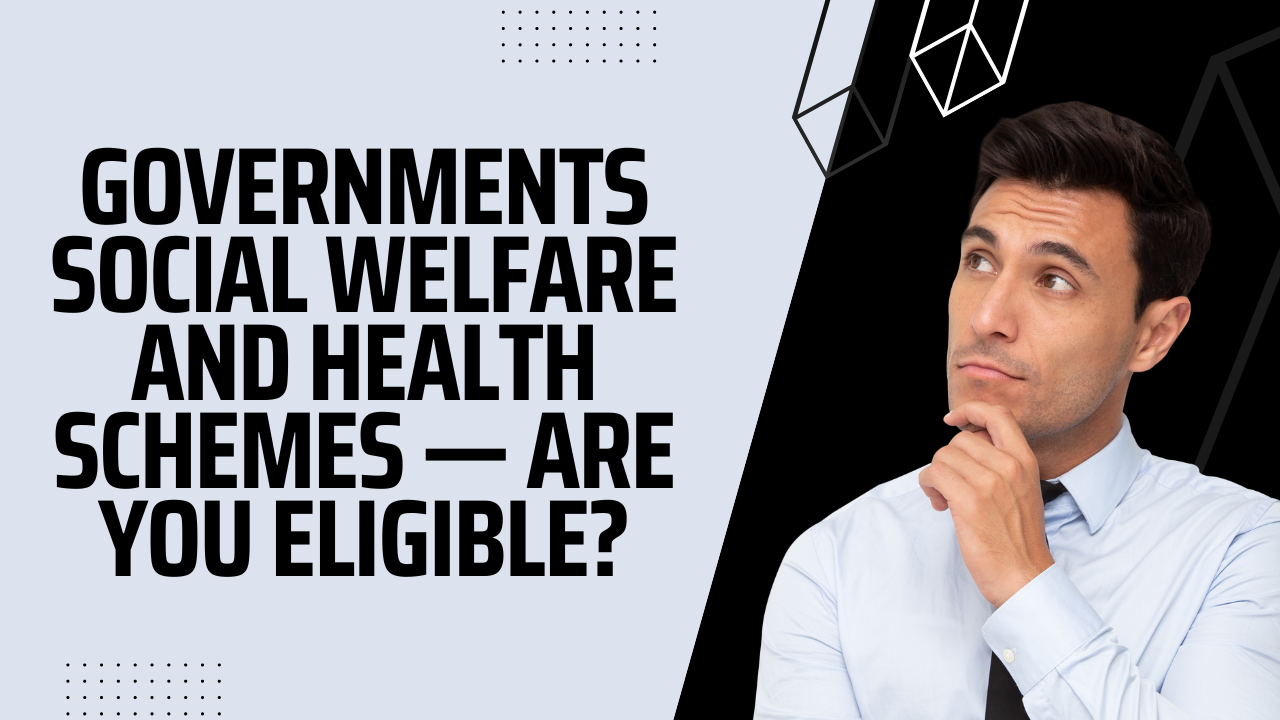Many governments worldwide implement social welfare and health schemes to provide financial assistance and healthcare benefits to eligible citizens. These schemes aim to support individuals and families, especially those from vulnerable or economically disadvantaged backgrounds, by offering various services and benefits. Eligibility criteria vary depending on the specific scheme and the country’s policies.
Social Assistance Programs:
Social assistance programs are government initiatives designed to provide financial support and assistance to individuals and families facing economic challenges. These programs aim to alleviate poverty, reduce inequality, and ensure basic necessities for vulnerable or disadvantaged populations. The eligibility criteria for social assistance programs vary depending on the specific scheme and the country’s policies. Some common types of social assistance programs include:
- Welfare Benefits: These programs provide financial aid to low-income individuals and families to meet their basic needs, such as food, clothing, and shelter. Eligibility is typically based on income levels and household size.
- Food Assistance Programs: Food assistance programs, also known as food stamps or food banks, provide nutritional support to individuals and families who are struggling to afford an adequate diet. Eligibility is often determined by income and asset limits.
- Housing Support: Housing assistance programs offer financial aid or subsidized housing to low-income individuals or families to ensure access to safe and affordable housing. Eligibility criteria may consider income, family composition, and housing needs.
- Unemployment Benefits: Unemployment benefits provide financial support to individuals who have lost their jobs and are actively seeking employment. Eligibility is typically based on recent employment history and reasons for job loss.
- Disability Benefits: Disability benefits are provided to individuals with disabilities to support their daily living expenses and healthcare needs. Eligibility criteria assess the type and severity of the disability and its impact on the person’s ability to work.
Healthcare Insurance Schemes:
Healthcare insurance schemes are government-sponsored programs that aim to make healthcare accessible and affordable for citizens. These schemes provide financial protection and coverage for medical expenses, ensuring that individuals can receive necessary medical care without incurring significant out-of-pocket costs. Eligibility criteria for healthcare insurance schemes vary across countries and programs. Some common types of healthcare insurance schemes include:
- Medicaid (United States): Medicaid is a joint federal and state program that provides health coverage to low-income individuals and families, including pregnant women, children, elderly, and people with disabilities.
- Medicare (United States): Medicare is a federal health insurance program that primarily covers individuals aged 65 and older, as well as some younger individuals with disabilities.
- Ayushman Bharat (India): Ayushman Bharat – Pradhan Mantri Jan Arogya Yojana (PM-JAY) is a health insurance scheme in India that provides coverage for over 50 crore beneficiaries from economically vulnerable families.
- National Health Service (NHS – United Kingdom): The NHS provides comprehensive healthcare services to all UK residents, funded through taxation, and offers medical treatment free at the point of use.
- Medicare (Australia): Medicare in Australia is a public health insurance scheme that provides access to a range of healthcare services for Australian citizens and certain eligible visitors..
Maternity and Childcare Support:
Maternity and childcare support programs are designed to provide assistance and benefits to pregnant women, new mothers, and children to ensure their health and well-being during and after pregnancy. These programs aim to promote safe pregnancies, maternal health, and child development. Eligibility criteria for maternity and childcare support may vary depending on the country and specific programs. Some common types of maternity and childcare support include:
- Maternity Grants: Maternity grants provide one-time financial assistance to pregnant women to cover expenses related to childbirth and early childcare. Eligibility may consider income levels and the number of children in the family.
- Child Nutrition Programs: These programs offer nutritional support, such as free or subsidized meals, to pregnant women and young children to ensure proper nutrition during critical stages of development.
- Childcare Subsidies: Childcare subsidies provide financial assistance to working parents or low-income families to help them afford childcare services while they work or attend educational programs.
- Immunization and Vaccination Support: Governments may provide free or subsidized vaccinations for pregnant women and children to protect them from preventable diseases.
Elderly and Senior Citizen Welfare:
Elderly and senior citizen welfare programs are designed to provide support and assistance to the aging population. These programs aim to improve the quality of life, ensure healthcare access, and promote social inclusion for older individuals. Eligibility criteria for elderly welfare programs may consider age, income levels, and specific needs of the senior citizens. Some common types of elderly and senior citizen welfare support include:
- Pension Schemes: Pension programs offer regular financial assistance to elderly individuals who have retired from their work. Eligibility may be based on age, income, and the number of years contributed to the pension scheme.
- Senior Citizen Healthcare: Governments may provide specialized healthcare services for senior citizens, including regular health check-ups, geriatric care, and age-related medical treatments.
- Assisted Living Facilities: Some welfare programs offer assisted living facilities or senior citizen homes for elderly individuals who need specialized care and support.
- Elder Abuse Prevention: Elder abuse prevention programs aim to protect senior citizens from physical, emotional, or financial abuse and provide support services to victims.
Education and Scholarship Schemes:
Education and scholarship schemes are initiatives by governments to support students’ academic pursuits and provide financial assistance to deserving individuals. These schemes aim to promote access to quality education, encourage skill development, and reduce educational disparities. Eligibility criteria for education and scholarship schemes may vary based on the level of education, academic performance, and socio-economic background. Some common types of education and scholarship schemes include:
- Merit-Based Scholarships: These scholarships are awarded to students based on their academic achievements, such as high grades or performance in competitive exams.
- Need-Based Scholarships: Need-based scholarships are provided to students from economically disadvantaged backgrounds who require financial assistance to pursue education.
- Girl Child Education Schemes: These schemes aim to promote girls’ education and offer scholarships to girls to encourage their enrollment and retention in schools.
- Postgraduate Scholarships: Postgraduate scholarships support students pursuing higher studies, including masters and doctoral degrees, in various fields.
- Research Scholarships: Research scholarships are awarded to students engaged in research projects or pursuing doctoral studies.
Rural Development Programs:
Rural development programs focus on uplifting rural communities, improving infrastructure, and enhancing the quality of life for residents in rural areas. These programs aim to reduce rural-urban disparities and ensure access to basic services and amenities. Eligibility criteria for rural development programs may consider residence in rural areas and specific socio-economic factors. Some common types of rural development programs include:
- Infrastructure Development: These programs aim to improve rural infrastructure, including roads, water supply, sanitation, and electrification.
- Agricultural Development: Agricultural programs provide support to farmers through subsidies, training, and access to modern farming techniques.
- Rural Employment Schemes: Employment programs offer job opportunities to rural residents through initiatives like rural works projects and skill development programs.
- Housing Schemes: Rural housing schemes provide financial assistance or subsidies for constructing or renovating houses for those living in rural areas.
- Health and Sanitation Initiatives: Health and sanitation programs focus on providing healthcare facilities, immunization, and awareness campaigns in rural areas.
Employment and Skill Development Schemes:
Employment and skill development schemes aim to enhance employability, provide job opportunities, and empower individuals with relevant skills for the workforce. These schemes target both unemployed individuals and those seeking to upgrade their skills for better job prospects. Eligibility criteria for employment and skill development programs may consider age, educational qualifications, and employment status. Some common types of employment and skill development schemes include:
- Vocational Training Programs: Vocational training schemes offer skill development and training in various trades to enhance employability.
- Job Placement Services: Employment programs provide job placement services, connecting job seekers with potential employers.
- Entrepreneurship Support: Some schemes support aspiring entrepreneurs by offering training, mentoring, and financial assistance to start their businesses.
- Youth Employment Initiatives: Youth employment schemes target young job seekers and provide training and job opportunities to address youth unemployment.
- Self-Employment Schemes: Self-employment programs support individuals in starting their small businesses or ventures.
FAQs (Frequently Asked Questions):
1. Who can apply for education and scholarship schemes?
Eligibility for education and scholarship schemes varies based on the specific program. Some scholarships are merit-based, while others are need-based. Common eligibility criteria may include academic performance, financial need, and the level of education (undergraduate, postgraduate, etc.).
2. Are rural development programs limited to agricultural initiatives only?
No, rural development programs encompass various initiatives beyond agriculture. They focus on overall development, including infrastructure, healthcare, education, employment, and housing in rural areas.
3. How can I find out about available employment and skill development schemes?
You can inquire about employment and skill development schemes through government employment exchanges, local employment offices, or the websites of relevant government departments. Additionally, career counseling centers and vocational training institutes can provide information.
Conclusion:
Government social welfare and health schemes play a vital role in supporting various sections of society, including vulnerable populations, students, senior citizens, and rural communities. These schemes aim to provide financial assistance, improve access to basic services, promote education, and create employment opportunities. Eligibility criteria for these schemes can vary, and it is essential for individuals to understand the specific guidelines and application processes.
Read More:
- Post Office Savings Account: Benefits and How to Open an Account
- 7 Simple Ways to Start Saving for a Bright Future
- How can I grow my savings fast?
- Saving Account: Types, Interest rates, and eligibility criteria




